The Rise of Psilocybin Therapy in Oregon: A Comprehensive Guide

Psilocybin therapy in Oregon has emerged as a groundbreaking approach to treatment for mental health conditions. This innovative form of psychedelic-assisted therapy uses psilocybin, the active compound found in certain mushrooms, to help individuals address various psychological conditions, like major depressive disorder. Oregon has become a pioneer in the United States by legalizing psilocybin and regulating its use for therapeutic purposes, sparking interest among those seeking alternative methods to improve their mental well-being.
This comprehensive guide explores the rise of psilocybin therapy in Oregon, providing insights into its legality, available services, and potential benefits. Readers will learn about the fundamentals of psilocybin therapy, understand the current laws and regulations in Oregon, and discover a reputable psilocybin services provider in the state. Additionally, the guide addresses common questions about accessing psilocybin/psychedelic therapy and offers valuable information for those considering this emerging therapeutic option.
What is Psilocybin Therapy?
Psilocybin therapy is an innovative approach to mental health treatment that utilizes psilocybin and psilocin, naturally occurring psychedelic compounds found in certain species of mushrooms. This form of therapy has gained significant attention in recent years due to its potential to address various psychological conditions. Psilocybin has been used for thousands of years by indigenous peoples in parts of Mexico and Central America as part of sacred and ancient traditions.
Read The Safety of Psilocybin Therapy
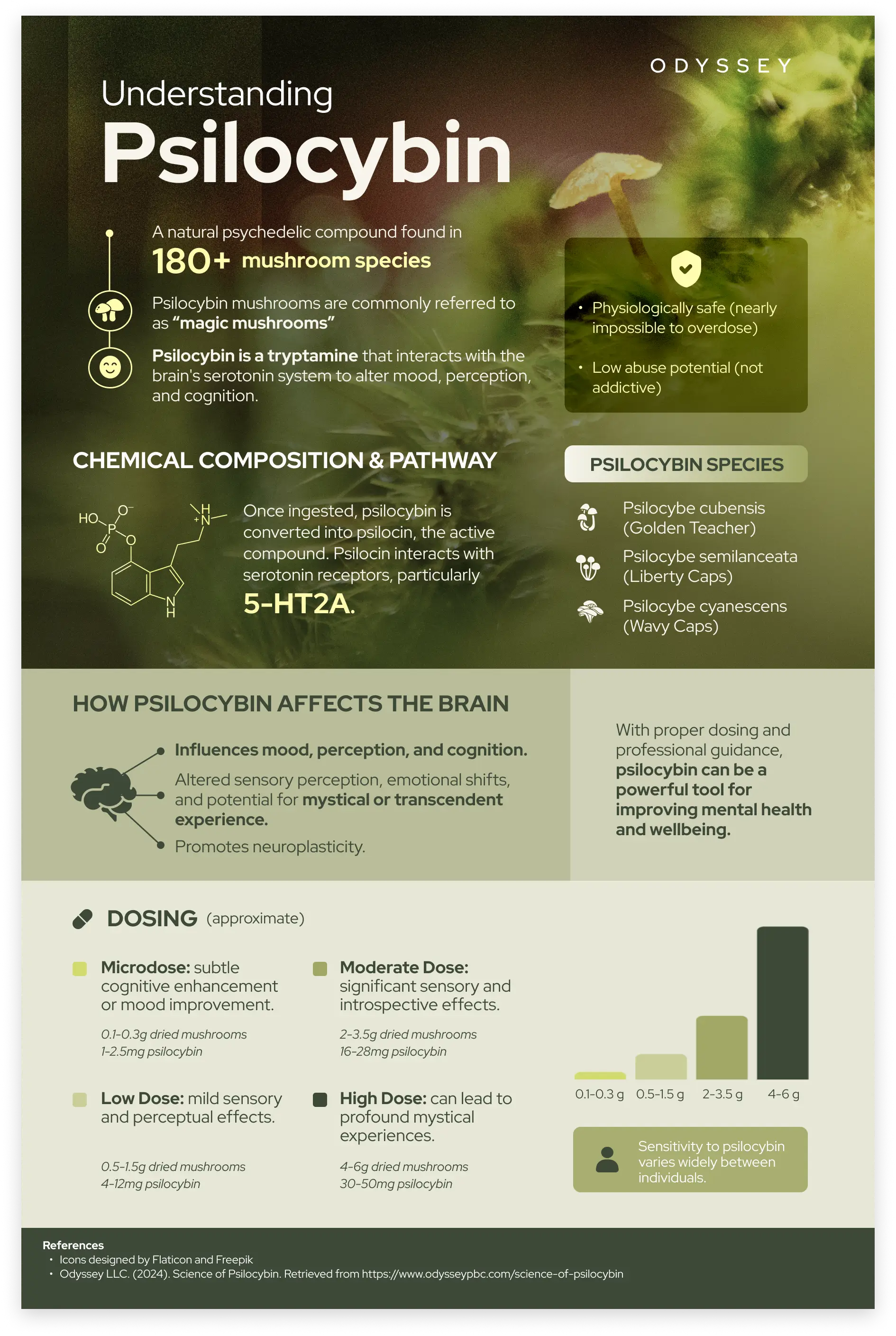
The Science of Psilocybin
Psilocybin belongs to a class of serotonergic psychedelics, similar to LSD and mescaline, which are known for their profound effects on consciousness and perception. Upon ingestion, psilocybin is rapidly metabolized into psilocin, the active compound responsible for the psychoactive effects. Psilocin works by binding to serotonin 5-HT2a receptors, particularly on cortical pyramidal cells in the brain. These receptors are integral to mood regulation, cognition, and perception, and their activation by psilocin can lead to altered states of consciousness.
The effects of psilocybin use can vary significantly between individuals and are influenced by factors such as dosage, setting, and the psychological state of the person. Common experiences include euphoria, visual and auditory distortions, spiritual or mystical experiences, and a sense of detachment from the self. Research suggests that these effects are due to the disruption and reorganization of typical neural networks, particularly in the default mode network (DMN), which is involved in self-referential cognition.
This reorganization of brain activity is thought to underlie the therapeutic potential of psilocybin. By temporarily altering how the brain processes information and emotions, psilocybin may allow individuals to gain new perspectives on their thoughts and behaviors. This can be particularly beneficial for those suffering from conditions like depression, anxiety, PTSD, and substance use disorders, where rigid patterns of thinking and emotional response play a significant role in the persistence of symptoms.
Psilocybin for Mental Health
Research has shown promising results for psilocybin therapy in treating depression and other mental health conditions. Clinical trials have demonstrated its potential to reduce depression symptoms, including in cases of treatment-resistant depression. A recent phase 2 double-blind trial found that a single 25 mg dose of synthetic psilocybin, administered in conjunction with psychotherapy, led to significantly lower levels of depressive symptoms after three weeks compared to a control dose.
Psilocybin therapy has also shown encouraging results in treating addiction, which is notoriously difficult to manage, as well as post-traumatic stress disorder (PTSD), anxiety, obsessive-compulsive disorder (OCD), and other mental health issues. Additionally, studies have explored its potential benefits for anxiety, pain, and existential distress in patients with serious medical illnesses, such as advanced cancer.
Read: Psilocybin Therapy for Depression and Psilocybin Therapy for Obsessive-Compulsive Disorder (OCD)

The Process of Psilocybin-Assisted Therapy
Preparation
The preparation phase is crucial in setting the foundation for a successful psilocybin therapy session. During this phase, the client and therapist work together to establish a strong therapeutic alliance, which is essential for a safe and effective experience. This involves in-depth discussions about the client's goals, fears, and expectations for the session. The therapist helps the client cultivate a mindset that is open to whatever the experience may bring, including potential challenges. This phase is also when logistical details, such as completing necessary paperwork and discussing the session's structure, are addressed. By focusing on preparation, the client is better equipped to navigate psilocybin use with a sense of trust and readiness.
Administration
The administration phase is the core of psilocybin therapy, where the psychedelic substance is ingested under the supervision of trained professionals. The setting is carefully controlled to create a supportive and secure environment that enhances the therapeutic potential of the experience. Typically, the session takes place in a comfortable, quiet space with soft lighting and calming music, designed to help the client relax and focus inward. The dosage of psilocybin is tailored to the individual’s needs, balancing safety with the therapeutic goal of facilitating profound psychological insights. Throughout the session, therapists remain present to offer guidance, reassurance, and emotional support, ensuring that the client feels safe as they navigate the altered state of consciousness induced by psilocybin. Some clients, especially those with trauma or prone to panic attacks, may require additional support to navigate their experience effectively.
Integration
The integration phase is where the insights and experiences from the psilocybin session are processed and incorporated into the client’s daily life. This phase is critical for translating the often intense and abstract experiences of a psilocybin session into meaningful, lasting change. During integration, the client works with their therapist to revisit the emotions, thoughts, and revelations that emerged during the session. Together, they explore how these insights can be applied to address the client's specific mental health challenges or personal growth objectives. Integration sessions may involve a variety of therapeutic techniques, such as talk therapy, journaling, or mindfulness practices, to help solidify the benefits of the psilocybin experience. Proper integration ensures that the therapeutic effects of psilocybin are not fleeting but become a stable part of the client’s psychological framework, promoting long-term well-being and resilience.

The Legal Status of Psilocybin in Oregon
Measure 109 and its Implications
In November 2020, Oregon made history by becoming the first state in the United States to legalize psilocybin in facilitated settings. This groundbreaking initiative, known as Measure 109, established a framework for the manufacture, sale, and administration of psilocybin for mental health purposes. The measure draws inspiration from the 1998 Oregon Medical Marijuana Act and includes 134 sections that outline the program's structure and regulations.
Under Measure 109, the Oregon Health Authority (OHA) has been given new responsibilities, including licensing and disseminating research on safety and efficacy. The measure also establishes an advisory board answerable to the OHA, setting prerequisites and standards for issuing licenses and establishing a psilocybin service center.
Read: How to Get Legal Psilocybin in Oregon
The Oregon Psilocybin Services Program
The Oregon Psilocybin Services (OPS) program has been implemented to oversee the legal use of psilocybin in the state. As of last year, the Oregon Health Authority has licensed over 20 service centers to administer psilocybin and over 200 facilitators to assist clients during sessions. To access psilocybin services, individuals must be 21 years of age or older and participate in a preparation session with a licensed facilitator before the administration session.
Personal Use vs. Licensed Service Centers
Measure 109 does not allow for retail sales or personal cultivation of psilocybin mushrooms. The administration and consumption of psilocybin are permitted only at a licensed psilocybin service center under the supervision of licensed psilocybin service facilitators. This distinguishes Oregon's program from other substance legalization efforts.
To become a facilitator, individuals must complete a 160-hour training program approved by the health authority, including 120 hours of core curriculum and 40 hours of hands-on practicum training. These training programs and administrative rules aim to ensure that facilitators are well-equipped to treat people throughout their psilocybin experience.
As the industry develops, Oregon is essentially running an experiment in real time. The state has set guidelines and maximum doses based on existing data from clinical trials, but facilitators have the flexibility to adjust dosages as they see fit for individual clients. With thousands of clients served so far, Oregon's psilocybin program is already providing valuable insights into the potential benefits and challenges of regulated psychedelic therapy.
Ongoing Research
Oregon’s pioneering psilocybin program is not only leading the way in providing state-regulated psychedelic access but is also at the forefront of ongoing research aimed at improving and understanding these therapies. One significant area of focus is the development of best practices for psilocybin therapy. Researchers at Oregon Health & Science University (OHSU) have collaborated with experienced facilitators to establish a set of 22 key measures for delivering safe and effective psilocybin services. This effort is critical, as Oregon’s psilocybin program is the first of its kind, with no established guidelines to draw from. The study emphasizes the importance of creating a supportive environment, monitoring client outcomes, and ensuring safety throughout the therapeutic process.
In addition to establishing best practices, Oregon is also exploring the broader impact of psilocybin therapy on mental health. Since the program's inception, over 6,500 individuals have received psilocybin, providing a wealth of real-world data that is helping to inform future research and refine therapeutic approaches. The Oregon Health Authority (OHA) is set to implement more rigorous data collection requirements in 2024, which will further enhance understanding of psilocybin’s effects across diverse populations.
As Oregon continues to expand its drug therapy program, ongoing research will play a crucial role in shaping the future of psychedelic therapies, not just in Oregon but across the United States. The findings from these studies are likely to influence how other states approach the legalization and regulation of psilocybin therapy, making Oregon a key player in the evolving landscape of psychedelic medicine.
The Best Psilocybin Services in Oregon
Patient Experiences & Outcomes
Psilocybin services in Oregon have shown promising results for individuals seeking personal growth and healing. Here are several experiences from real people who joined a psilocybin retreat or private session in Oregon with Odyssey.
Connor:
“I was diagnosed with OCD 21 years ago. Since then I have tried so many different treatments and therapies that I have lost count. I have been in weekly therapy for the past 5+ years and on a heavy SSRI dose.
Odyssey’s experience has changed my life. I’m now 5 weeks post-ceremony, and only can I tell a difference in my symptoms, but everyone around me can. My first week back, my therapist couldn’t believe the difference. For the first time in many years, I can take a shower with no assistance. This has easily given me back an hour of every day.
I’m so thankful for Odyssey and the experience they helped facilitate for me. It has helped me be a better father, husband, sibling and friend. I encourage anyone who could benefit (and I think that’s nearly everyone) to explore the opportunity and see if it could offer them similar benefits. They might just be weeks away from the life they were meant to live.”
Gentry:
“This was the single most meaningful experience of my life. I feel like I'm now the person I've always been but didn't realize it until now
The experience can be very challenging and should be done in a controlled environment. I honestly don't know how I would have managed had I been on my own. Odyssey absolutely nailed everything.”
Laura:
“This experience, while challenging, was also imbued with a sense of peace, bliss, and a serene calmness that enveloped me in a way I've never felt in my almost 50 years of existence. I experienced an intense feeling of love, a deep connection with my loved ones, and a profound oneness with the world around me.
I can confidently say it has been a pivotal turning point in my life. I find myself more in touch with my emotions, often moved to tears not by sadness, but by an overwhelming sense of happiness and gratitude. This heightened emotional awareness has brought a sense of lightness, a pervasive happiness that colors my daily life.
My experience with Odyssey has been overwhelmingly positive and I feel fortunate to have connected with Gabriel and his team. Their dedication to healing and personal transformation is evident, and I believe they are making significant strides towards making a positive impact in the world.”
Oregon Psilocybin Group Retreats
Group retreats are an excellent option for those looking to experience psilocybin in a supportive community setting. At Odyssey, these retreats are designed to foster deep connections between participants while offering the therapeutic benefits of psilocybin in a carefully curated environment. During a group retreat, participants engage in guided psilocybin sessions under the supervision of experienced facilitators. The retreat setting often includes scenic natural surroundings, which enhance the overall experience by promoting relaxation and introspection.
Group retreats typically span several days, allowing ample time for preparation, the psilocybin experience, and integration. Participants benefit from the shared journey, as the group dynamic can provide a sense of camaraderie and mutual support. Odyssey ensures that each participant is thoroughly prepared for the experience through pre-retreat counseling and workshops that help individuals set intentions and address any concerns. Post-session integration sessions are also a key component, where participants gather to share their experiences and work together to integrate the insights gained into their daily lives.
Oregon Psilocybin Private Sessions
For those seeking a more individualized approach, private psilocybin sessions offer a personalized and intimate experience. At Odyssey, private sessions are tailored to meet the specific needs and goals of the individual, and based on protocols used in psilocybin therapy research. These sessions provide a one-on-one therapeutic experience, where the client receives undivided attention from a skilled facilitator. The personalized nature of private sessions allows for a deeper exploration of personal issues, traumas, and aspirations in a safe and controlled environment.
Private sessions at Odyssey are highly customizable, with options for single or multiple sessions depending on the client’s therapeutic needs. The process begins with an in-depth consultation to understand the client’s background, goals, and any potential concerns. This is followed by the psilocybin experience, where the facilitator ensures that the environment is conducive to the client’s comfort and safety. After the session, the facilitator works closely with the client during the integration phase, helping them to process the experience and apply the insights gained to foster long-term growth and healing.
Both group retreats and private sessions at Odyssey are conducted with the highest standards of care, ensuring that each participant or client receives the support they need throughout their psilocybin journey. Whether you prefer the shared experience of a group setting or the focused attention of a private session, Odyssey in Oregon offers some of the best psilocybin options available – get matched to the best experience for you.
Conclusion
The rise of psilocybin services in Oregon marks a significant shift in mental health crisis treatment. This groundbreaking approach has an impact on how we view and manage psychological conditions, offering new hope to those struggling with depression, anxiety, and addiction, and other mental health issues. Oregon's pioneering program to legalize and regulate psilocybin for therapeutic use has paved the way for further research and development in the psilocybin therapy field. The state's carefully structured framework, including licensed service centers and trained facilitators, ensures safe and responsible access to this promising treatment.
As more people in Oregon experience the potential benefits of psilocybin, it's likely to spark broader discussions about mental health care and treatment options. The early success stories and positive outcomes reported by participants suggest that this therapy could play a crucial role in future treatment plans. However, it's essential to remember that psychedelic therapy is still in its early stages, and ongoing research will be vital to fully understand its long-term effects and optimal use. As Oregon continues to lead the way, other states and countries will be watching closely, potentially leading to wider acceptance and availability of psychedelic-assisted therapies in the future.
Psilocybin Therapy in Oregon FAQs
Is psilocybin therapy legal in Oregon?
- Psilocybin services are legal in Oregon. The state legalized this through Measure 109, allowing licensed professionals to administer psilocybin in supervised, therapeutic settings.
What is psilocybin therapy in Oregon?
- Psilocybin services in Oregon involve the supervised use of psilocybin, the psychoactive compound in magic mushrooms. Mental health conditions like depression and anxiety are valid reasons for seeking psilocybin services.
How do I access psilocybin therapy in Oregon?
- You can access psilocybin services in Oregon by visiting licensed psilocybin service centers or retreats that are regulated under the Oregon Health Authority's guidelines, such as Odyssey.
What conditions can psilocybin therapy treat?
- Early research has shown psilocybin therapy to be promising in the treatment of depression, anxiety, and addiction.
What is the process for psilocybin therapy in Oregon?
- The process includes preparation sessions, a supervised psilocybin experience, and post-session integration, all designed to maximize the therapeutic benefits.
Is psilocybin therapy safe?
- When administered in a controlled environment by trained professionals, psilocybin therapy is considered safe. However, potential risks include anxiety, nausea, or psychological distress, particularly for those with pre-existing conditions like bipolar disorder or schizophrenia.
What are the benefits of psilocybin therapy?
- Psilocybin therapy can promote mental well-being by reducing symptoms of depression, anxiety, and addiction, often providing lasting benefits after just one session.
How long does a psilocybin therapy session last?
- A psilocybin therapy session typically lasts between 4 to 6 hours, depending on the dosage and individual response, followed by integration support to process the experience.

.svg)
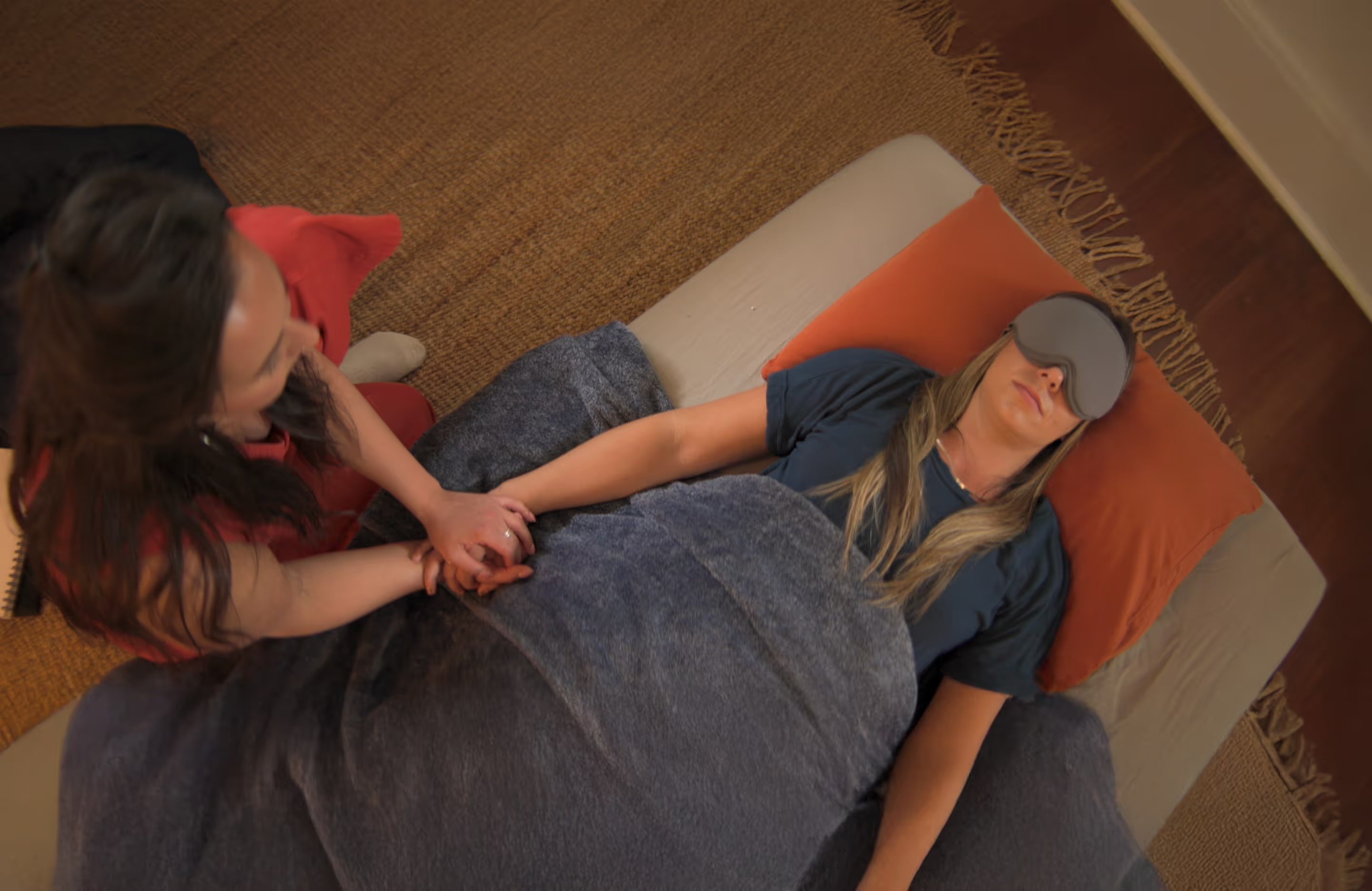
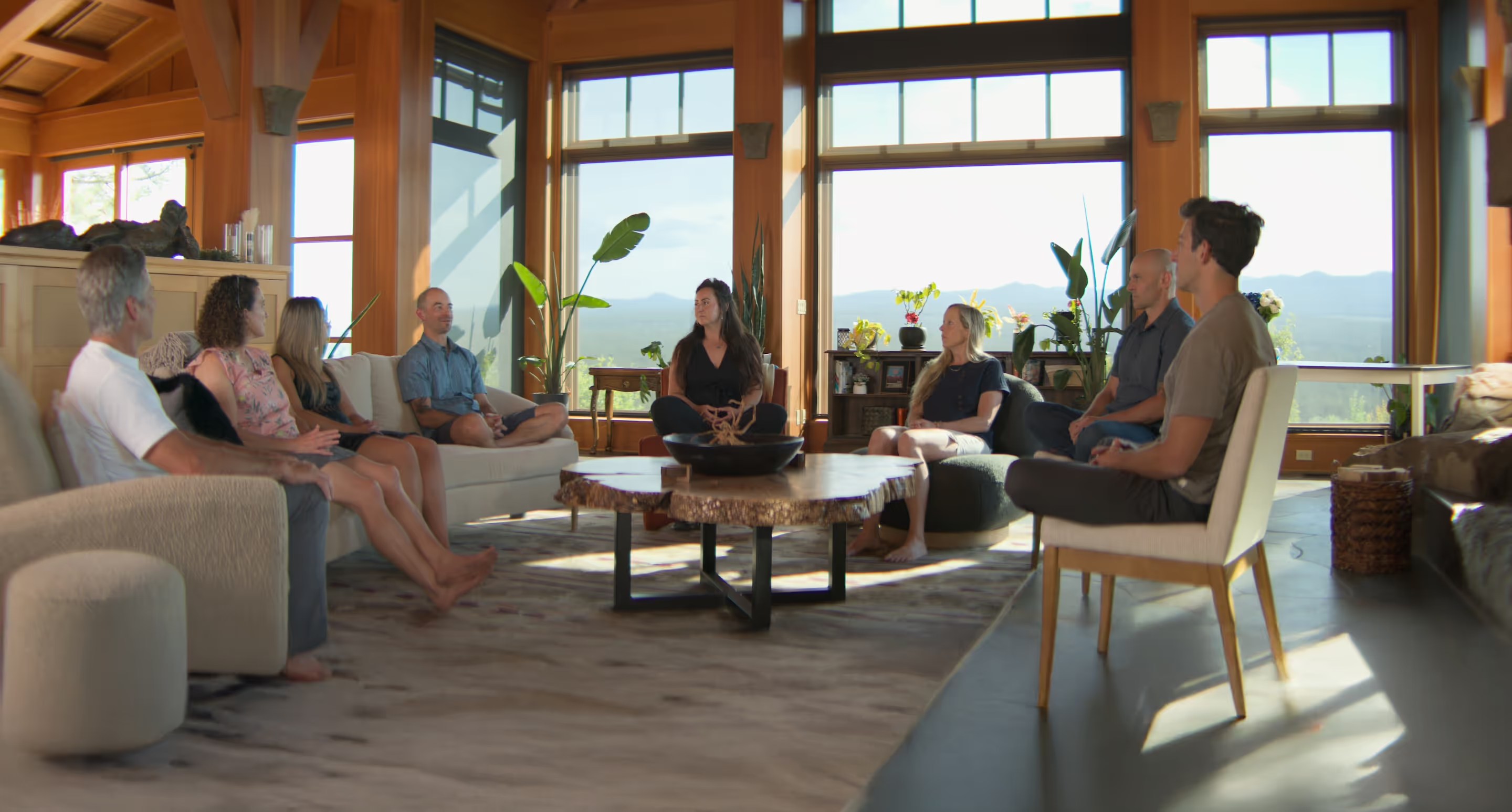


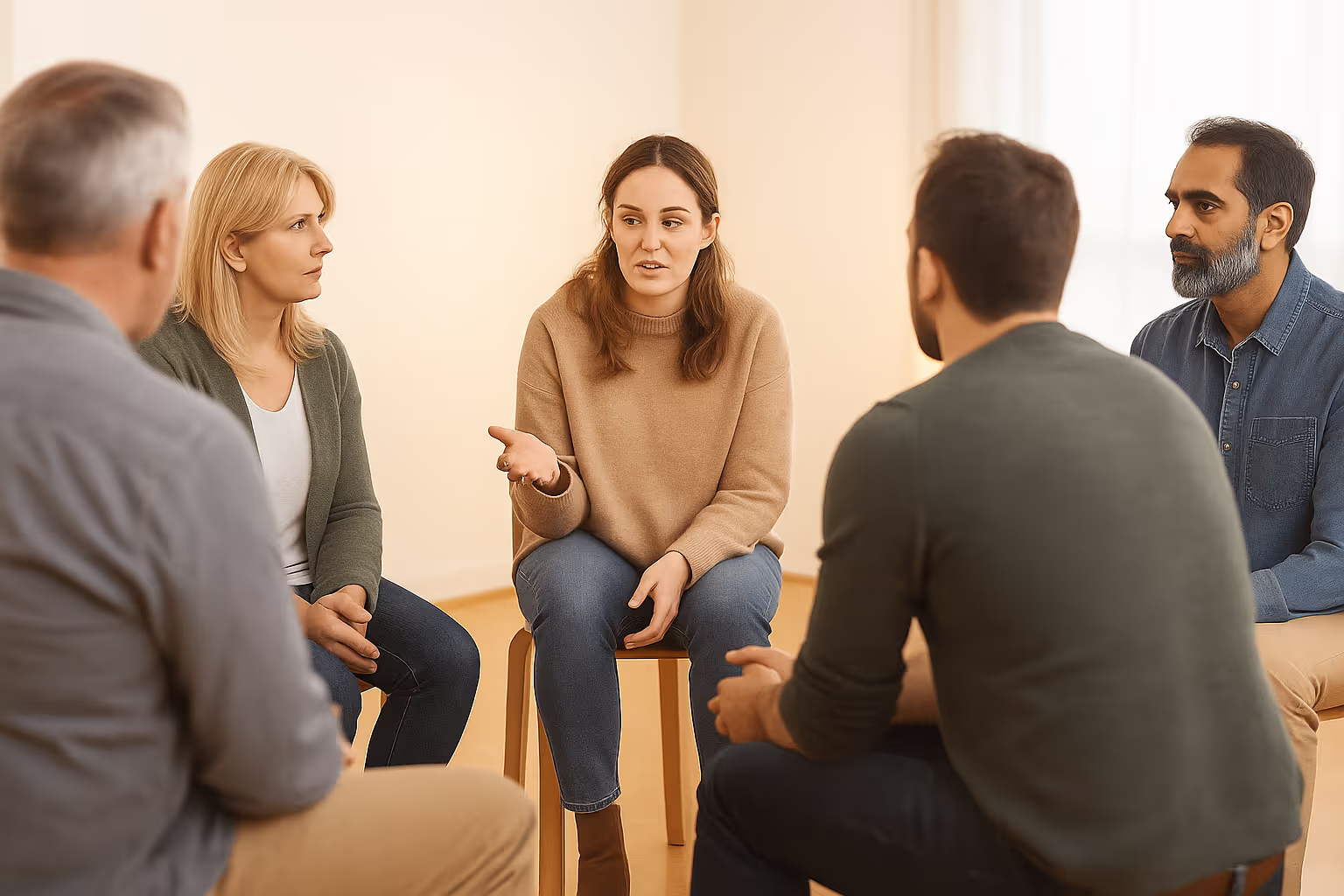
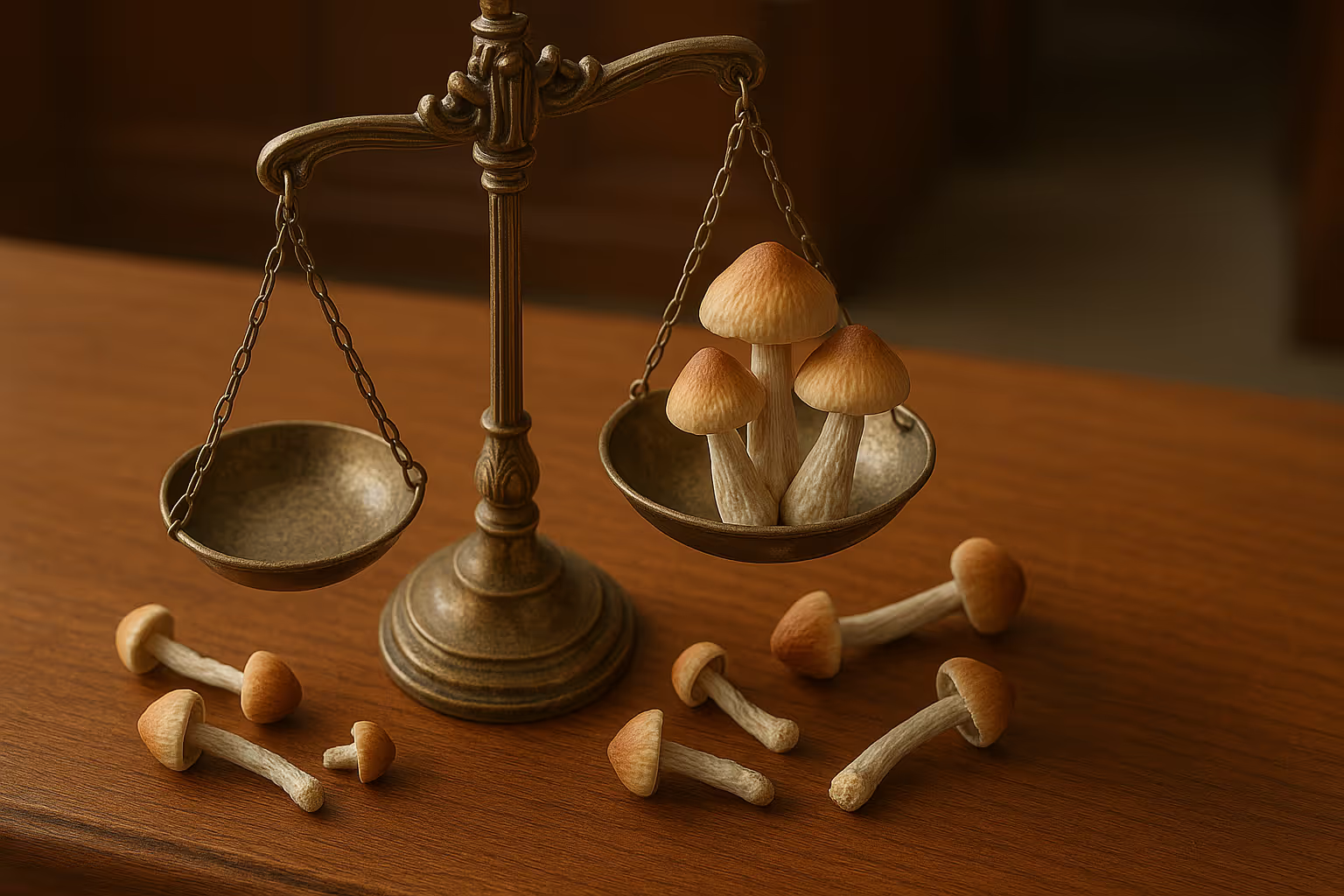



.svg)